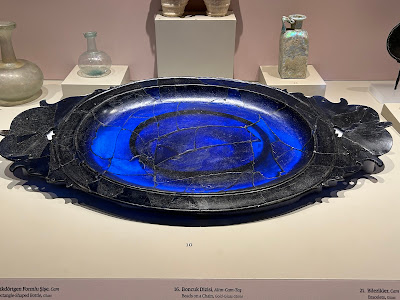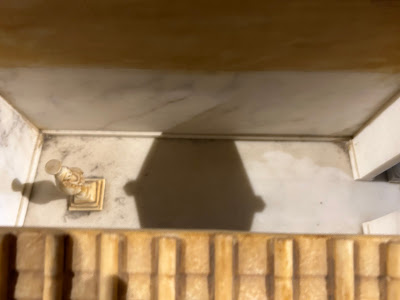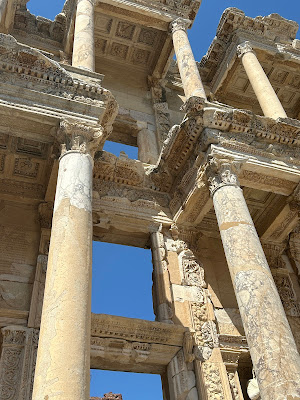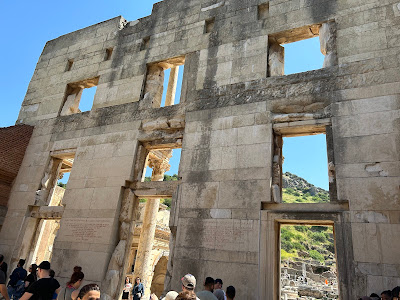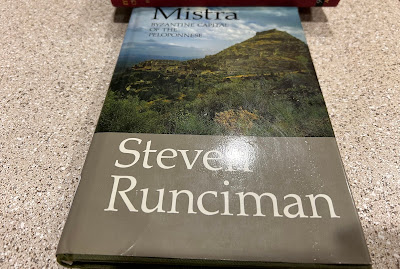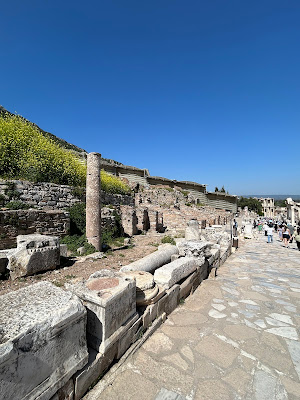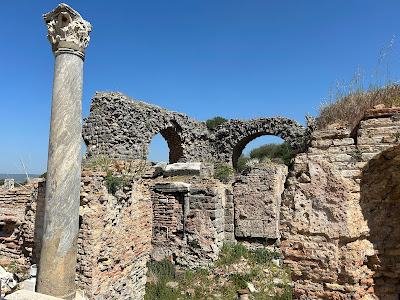This weekend I finished Steven Runciman's book on Mistra, the capital of the Despotate of the Morea.
Mistra (or Mystras, modern Greek), as you might remember from our visit there in 2023 (here, here, and here) was originally a castle built on a spur of Mt. Taygetus (overlooking the ancient site of the Greek polis Sparta) during the Frankish conquest of Greece following the invasion of the Fourth Crusade and the capture and looting of Constantinople and the establishment of the Latin Empire of Byantium (A.D. 1204 - 1261). The castle was taken back by the Byzantines in A.D. 1262.
The book is a history of from the building of the castle (eventually a walled town) to its final destruction in A.D. 1823 by Ottoman forces as part of the Greek War of Independence.
Runciman paints as much of a history as he can based on a series of not plentiful sources: for many years the history of Mistra was part of the larger history of Frankish Principality of the Morea, which was conquered by the Byzantine (Greek) Despotate of the Morea.
During the life of the Despotate of the Morea (technically A.D. 1349 - 1460), it remained the domain of the sons of the Emperors of Byzantium, whether the House of Kantakouzenos (A.D. 1349 - 1383) or the House of Palaiologos (A.D. 1383 - 1460). But it also existed in the greater realm of Byzantine politics and the political situation of the 14th and 15th Century Balkans and Anatolia.
And therein, as is evidenced through Runciman's book, lies the problem (as a note, the book is excellent, as all of Runciman's are, and highly recommended).
This is the situation following the Fourth Crusade in A.D. 1204:
The Empire of Nicea, The Empire of Trebizond, and The Despotate of Epirus were all Byzantine successor states from which the Empire of Nicea was the most successful in that it reconquered Constantinople.
This, in turn, is the situation in A.D. 1450:
You will note that the area controlled by the Byzantine Empire has shrunk dramatically. What is not shown by this graphic - but is discussed in Runciman's book - is the fact that even as the Byzantine Empire (and indeed, the Latin Empire) lost territory to the increasing power of the Ottoman State.
Part of this, of course, was simply bad luck: an earthquake in A.D. 1380 allowed the Ottomans to cross into Europe (interestingly not too far from Gelibolu (Gallipoli) near where we
stayed), the Black Death of A.D. 1347 which caused depopulation, and invasion by successor states seeking to increase their territory at the expense of the Empire. But the other parts - an attempt to re-establish Imperial boundaries and the glory of an Empire which could not financially support itself and a rather constant series of civil wars and lesser, more regional conflicts family members trying to become emperor, did not help matters at all.
The Byzantine Empire had become a vassal - in principle and in practice - by A.D. 1371 - and in a very real sense continued to exist only at the pleasure and convenience of the Ottoman state (until it became powerful enough to finally conquer them). Yet even in this, Byzantine Emperors and would-be emperors sought out Ottoman assistance to topple their opponents. Rather than spend their time trying to make the empire they had stronger, they spent time fighting over the scraps of a geography that was shrinking and a power that was diminishing.
Perhaps the greatest spectacle of this was post the conquest of Constantinople in A.D. 1453, the brothers Demetrius and Thomas Palaiologos - brothers who shared the rule of the Despotate of the Morea, continued to argue and fight among themselves, ultimately invoking the wrath of Mehmed the Conqueror, who simply invaded and snuffed out the last embers of the Byzantine Empire in Greece (of note, the Empire of Trebizond survived until A.D. 1461 and the Principality of Theodoro in what is now the Crimea until A.D. 1475).
---
"Ah T.B." (I can hear you saying) "this is interesting and all and I am sure glad that you enjoyed the book. But what does this have to do with anything?"
History, it has been said, does not repeat itself but it does rhyme - which I take to mean that there are principles provided in the study of history that remain applicable across the whole of human experience. While situations remain different, we as humans remain largely the same, and beneath cultures remain common human emotions and experiences which translate themselves into patterns which, if discerned, can be instructive.
Without delving into a great deal of history, suffice it to say that the Byzantine Empire went into effective decline around the 11th century A.D. through a series of lost battles, lost territory, leadership that got worse over time, and neighbors near and far who saw it as territory to be taken and riches to be plundered without realizing the larger role it played both in preventing invasions from Anatolia and preserving Classical learning for the future. This decline was not completely the fault of the Empire, but the Empire did not help itself by clinging to a vision of what it had been versus the reality of what it now was and tearing itself apart through a series of civil wars (I am not touching here on the financial policies of the Empire, but they were not good either following the reign of Manuel Komnenos [ruled A.D. 1143-1180]).
Ultimately the failure of the Byzantines to understand both their place in a changing world and that expeditions to recreate lost boundaries (it never really worked even under Justinian in the 6th Century A.D. when they had they money and the manpower), combined with their myopic focus on gaining power for this personage or that instead of focusing on the survival of the state as a whole, meant that their downfall was inevitable. And even in the microcosm of Mistras and the Despotate of the Morea, leaders continued to fight over power and land long after either truly had any meaning in the larger picture.
One can either choose to see one's position in the world and work to stabilize and improve the situation, or one can choose to seek past glories that are beyond current capabilities and fight to become the top fish in an ever shrinking pool. One road may lead to some element of stability and survival, the other simply to ruin.











